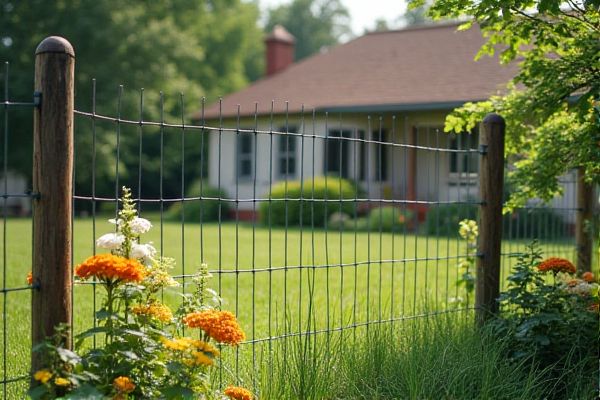
Chicken wire fence is lightweight and flexible, ideal for enclosing small animals and garden areas, while hardware cloth offers a sturdier, more durable barrier with smaller mesh sizes that better protect against pests and predators. Discover which option best suits Your fencing needs by reading the rest of the article.
Table of Comparison
| Feature | Chicken Wire Fence | Hardware Cloth |
|---|---|---|
| Material | Thin, flexible galvanized wire | Thick, welded steel wire mesh |
| Mesh Size | 1" to 2" hexagonal openings | 1/4" to 1/2" square openings |
| Durability | Moderate; prone to bending and rust | High; rust-resistant and rigid |
| Security | Low; easy to cut or climb | High; difficult to cut or break |
| Common Uses | Fencing for chickens and light animals | Rodent control, garden protection, small animal enclosures |
| Cost | Lower price per linear foot | Higher price due to stronger material |
| Installation | Easy to install and shape | Requires tools and effort due to stiffness |
Introduction to Chicken Wire Fence and Hardware Cloth
Chicken wire fence consists of lightweight, flexible hexagonal mesh commonly used for poultry enclosures, offering cheap and easy installation. Hardware cloth features a rigid, welded wire mesh with smaller openings, providing enhanced durability and protection against pests and predators. Choosing the right option depends on your project's need for strength, security, and longevity.
Material Composition and Structure
Chicken wire fence is typically made of galvanized steel wire woven into hexagonal patterns, offering flexibility and lightweight strength suitable for enclosing larger areas. Hardware cloth consists of welded wire mesh with square openings, crafted from thicker gauge wire to provide a more rigid and durable barrier that resists predators and small pests effectively. Your choice depends on whether you need a flexible fencing solution or a sturdier, more secure material for containment.
Common Uses and Applications
Chicken wire fence is commonly used for enclosing poultry, protecting garden beds from small animals, and creating lightweight barriers. Hardware cloth offers stronger protection and is ideal for securing smaller pests like rodents, reinforcing garden beds, and screening compost piles. Your choice depends on whether flexibility or durability is more important for your specific outdoor project.
Durability and Strength Comparison
Chicken wire fence, made from thin, flexible galvanized steel, offers lightweight protection ideal for small animals but lacks the durability and strength to withstand heavy impacts or predator attacks. Hardware cloth features thicker, welded wire mesh with smaller openings, providing superior resistance to bending, cutting, and tearing, making it more suitable for long-term security and protection against larger pests. The inherent rigidity and corrosion resistance of hardware cloth ensure it maintains structural integrity far longer than chicken wire in demanding outdoor environments.
Security and Predator Protection
Hardware cloth offers superior security and predator protection compared to chicken wire due to its thicker gauge and smaller mesh size, which prevent animals like raccoons, foxes, and snakes from breaking through. Chicken wire's larger openings and thinner wires make it easier for determined predators to tear or squeeze through, compromising the safety of chickens or small animals. For enhanced predator resistance and long-lasting durability, hardware cloth is the preferred choice in fencing solutions.
Ease of Installation
Chicken wire fence offers greater ease of installation due to its flexible, lightweight nature and larger mesh openings, allowing you to quickly shape and secure it with staples or nails. Hardware cloth, with its rigid, smaller mesh wire, requires more effort and precision for cutting and fastening, often needing tools like wire cutters and gloves for safety. Choosing chicken wire simplifies the setup process, especially for temporary or less critical enclosures.
Cost Analysis
Chicken wire fence typically costs less per linear foot than hardware cloth, making it a budget-friendly option for large perimeter enclosures. Hardware cloth, though more expensive upfront, offers greater durability and protection against small pests, potentially reducing replacement and maintenance costs over time. Investing in hardware cloth can lead to long-term savings due to its corrosion resistance and sturdier mesh compared to chicken wire.
Maintenance Requirements
Chicken wire fences require regular inspections to check for rust, loose staples, and potential damage caused by animals or weather, often needing occasional tightening or patching. Hardware cloth offers greater durability and resistance to wear, reducing the frequency of repairs and maintenance compared to chicken wire. Your choice impacts ongoing upkeep, with hardware cloth providing a longer-lasting, lower-maintenance fencing solution.
Aesthetic Considerations
Chicken wire fence offers a rustic and traditional appearance that blends seamlessly with garden settings, creating a charming, natural look. Hardware cloth features a finer, more uniform mesh that provides a sleek, modern aesthetic while enhancing security and durability. Your choice depends on whether you prefer the softer visual appeal of chicken wire or the clean, structured design of hardware cloth.
Choosing the Right Option for Your Needs
Chicken wire fence offers a lightweight and cost-effective solution for enclosing larger areas, making it ideal for keeping chickens contained and deterring larger pests. Hardware cloth provides a more durable and secure barrier with smaller mesh openings, perfect for protecting gardens from small rodents and predators. Evaluating your specific security needs and the type of animals you want to manage will help you choose the right option for your property.
 homyna.com
homyna.com